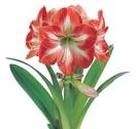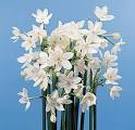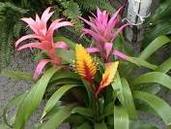|
This article is based on the Co-Op Extension Service January Gardening Calendar.
Getting Your Garden Ready Inside And Out If you still have some some spring flowering bulbs you haven't gotten around to planting you still have time but you need to get to it soon. They should still be fine if you get them planted. Don’t try to save them for another season, or they will dry up and be wasted. Snow actually can act as a great insulator of our plants during cold weather, so the pansies, violas and flowering kale should have fared fine if the weight of the snow didn’t damage them. As the snow melts, it also adds moisture into the ground. Consider adding a boost of fertilizer to your winter annuals on a warm day. Check your winter vegetable garden—if you planted one. Broccoli, kale and bok choy look fine even after a snow. If you over seeded with greens, even if they got zapped, they will rebound and begin to grow again. Snow is a good buffered from the severe cold weather. Later this month you can start planting English peas and it won’t be long before you can begin to plant other cool season vegetables. Once the holiday decorations are down, the house looks drab. Add some color with amaryllis bulbs and paper white narcissus. Bromeliads can give you months of color with little care and the left over poinsettias should last for months. Bringing color with flowers into the house makes the dark days of winter seem not so long. Clean Up Clean up is always in order. Remove debris, replenish mulch and monitor for winter weeds. I always mulch during the winter there days where it's warm enough to get out into the beds if they ever dry out. It also gives you a head start in spring, your beds will look great as everything starts to come up. In flower beds and vegetable gardens, use good sharp hoe to remove the weeds then mulch. In the lawn, you can spot spray with a broadleaf herbicide or hand pull. Try to keep them from growing larger and blooming, since the bigger they are, the harder they are to kill and if they bloom, they set more seeds for next year. Indoor Plants Houseplants indoors grow much more slowly in the winter months, so don’t over water one of my biggest mistakes. New growth is slow with shorter days and lower light levels. You may have to move your plants to a south window for the extra light. I also find I have to turn my plants every week or so that way they grow balanced. Catalogs While it is a slow gardening month outside, this can be a good month to plan. Seed catalogs are arriving regularly and vegetable gardening is gaining in popularity. Cool season gardens are always easier to grow, since we don’t have to contend with insects or diseases. So consider building a raised bed garden or even start some plants in pots. If you know you need to re-landscape some areas, begin researching ideas for new plants. Plot your yard on a sheet of graph paper and look at your options. Submitted by: Tamara Carl This article is based on the Co-Op Extension Service January Gardening Calendar. Getting Your Garden Ready Inside And Out If you still have some some spring flowering bulbs you haven't gotten around to planting you still have time but you need to get to it soon. They should still be fine if you get them planted. Don’t try to save them for another season, or they will dry up and be wasted. Snow actually can act as a great insulator of our plants during cold weather, so the pansies, violas and flowering kale should have fared fine if the weight of the snow didn’t damage them. As the snow melts, it also adds moisture into the ground. Consider adding a boost of fertilizer to your winter annuals on a warm day. Check your winter vegetable garden—if you planted one. Broccoli, kale and bok choy look fine even after a snow. If you over seeded with greens, even if they got zapped, they will rebound and begin to grow again. Snow is a good buffered from the severe cold weather. Later this month you can start planting English peas and it won’t be long before you can begin to plant other cool season vegetables. Once the holiday decorations are down, the house looks drab. Add some color with amaryllis bulbs and paper white narcissus. Bromeliads can give you months of color with little care and the left over poinsettias should last for months. Bringing color with flowers into the house makes the dark days of winter seem not so long. Amaryllis Bulbs Paper White Narcissus Bromeliads All pictures are free stock photos Clean Up
Clean up is always in order. Remove debris, replenish mulch and monitor for winter weeds. I always mulch during the winter there days where it's warm enough to get out into the beds if they ever dry out. It also gives you a head start in spring, your beds will look great as everything starts to come up. In flower beds and vegetable gardens, use good sharp hoe to remove the weeds then mulch. In the lawn, you can spot spray with a broadleaf herbicide or hand pull. Try to keep them from growing larger and blooming, since the bigger they are, the harder they are to kill and if they bloom, they set more seeds for next year. Indoor Plants Houseplants indoors grow much more slowly in the winter months, so don’t over water one of my biggest mistakes. New growth is slow with shorter days and lower light levels. You may have to move your plants to a south window for the extra light. I also find I have to turn my plants every week or so that way they grow balanced. Catalogs While it is a slow gardening month outside, this can be a good month to plan. Seed catalogs are arriving regularly and vegetable gardening is gaining in popularity. Cool season gardens are always easier to grow, since we don’t have to contend with insects or diseases. So consider building a raised bed garden or even start some plants in pots. If you know you need to re-landscape some areas, begin researching ideas for new plants. Plot your yard on a sheet of graph paper and look at your options. Submitted by: Tamara Carl |
Monthly Gardening Calendar
December 2015
Categories
All
|
|




 RSS Feed
RSS Feed
